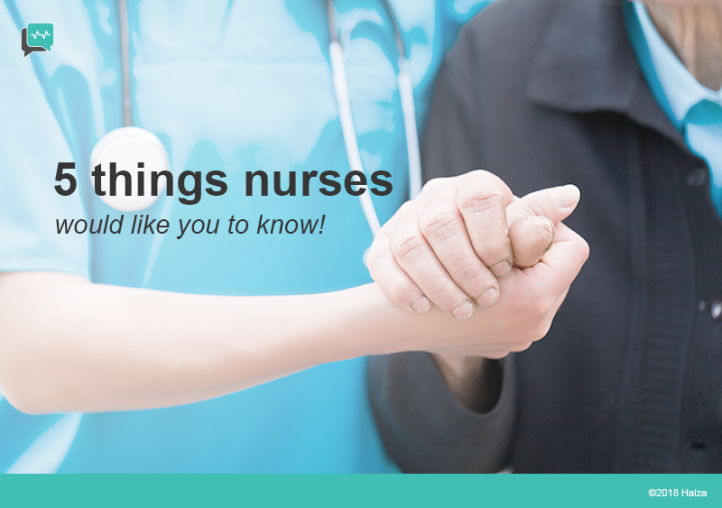5 Things Nurses Would Like You To Know

Though often overshadowed by doctors, nurses are the lifeblood of any hospital. As a patient, or even a visitor, you might have had some questions for the people attending to your every need. Whether it’s the hidden dangers of our profession, or just how we really feel about our patients, we know you get curious so here are some things we nurses would most like you to know about us.
1. We truly care about you as both a patient and as a human being, and we often feel badly that this is not always so obvious.

We could not do this physically and emotionally exhausting work if we didn’t care so much. But at the end of a 12hour short-staffed shift during which a doctor blamed you for a mistake you didn’t make, you admitted a brand-new mother with newly diagnosed terminal cancer, and your downstairs neighbor texted to say that something is leaking from your apartment, – well, you can understand that sometimes it’s hard to walk into a patient’s room oozing sunshine and rainbows. But we try!
2. We don’t expect or need a thank-you or a smile, but we always appreciate one!
This probably doesn’t really need an explanation. Since we are in contact with a lot of people who are very understandably not in a smiling mood, we are extra – appreciative of the smiles and thanks that we do get.
3. In many countries nursing ranks as one of the most dangerous professions. (Surprised?)
We are exposed every day to diseases transmitted by air, contact, or accidental needle sticks. We have back injuries from examining patients in bed and from repositioning them to prevent bedsores. We are physically attacked by patients with mental illness, drug or alcohol withdrawal symptoms, dementia, or just frustration and aggression. And because of erratic sleep schedules and other factors, night shift nurses are at high risk for accidents both in and out of the hospital.
4. We hope that you will question us about your medications, because many things can go wrong.
Here are just a few examples: The physician forgets about a patient’s medication allergy. The pharmacist reaches for the bottle next to the prescribed bottle. The medication is labelled “qid” rather than “qd” (take four times a day instead of one). The nurse grabs the wrong type of syringe. You will be much safer if you know the names and doses of your medications and when and how they are taken. (We often hear of people who have swallowed their suppository or carefully placed a capsule in an orifice other than their mouth. Please know how your medication is to be taken!)
5. We hope you are not ashamed of any part of your body.
We are accustomed to seeing severely misshapen bodies, untreated infections, and remarkably unusual injuries. We never judge your “private parts”- or any of your parts – no matter how small, large, wrinkly, stinky, or swollen. Most of us have seen and touched it all, and those of us who haven’t yet, will.
The bottom line is being a nurse means hard but rewarding work and helping people like you every day makes it worth all the long shifts and sleepless nights. All the same, we learn to deal with stress, but just remember we’re human too!
Jill Sabin Garner received her Bachelor of Science in Nursing (summa cum laude) from New York University. A Registered Nurse and Certified Diabetes Educator, she serves on the boards of both the New York State Coordinating Body and the Metropolitan New York Group of the American Association of Diabetes Educators.
